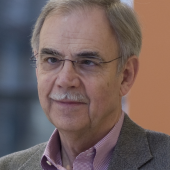
The Executive Board of the Program Committee invites a distinguished member of AIChE to present a comprehensive authoritative review of the chemical engineering science in his or her field of specialization. Selection criteria include:
1. the quality and relevance of the accomplishments of the lecturer in the technical field likely to be the subject of the lecture,
2. the communication skills of the lecturer,
3. the value of the lecture to the meeting attendees and the members of the Institute
To honor Dr. John M. Prausnitz of the University of California, Berkeley's exceptional impact on the profession, society, and generations of chemical engineering students, AIChE’s Board of Directors has agreed to rename the Institute Lecture to the John M. Prausnitz AIChE Institute Lecture. The AIChE Foundation gratefully acknowledges the generosity of John’s closest peers who have made lead gifts to establish an endowment to support the Lecture and ensure John’s name will be recognized in perpetuity.
This is the 69th AIChE Institute Lecture.
Supported by the AIChE Foundation.

Refreshments will be served.
This year's John M. Prausnitz AIChE Institute Lecturer is G. V. Rex Reklaitis, Burton and Kathryn Gedge Distinguished Professor, Purdue University who will speaking on "Process Systems Engineering Contributions in Pharmaceuticals".
Process Systems Engineering Contributions in Pharmaceuticals
G. V. Rex Reklaitis, Burton and Kathryn Gedge Distinguished Professor, Purdue University
Healthcare is a major and rapidly growing sector of every developed economy, with 2015 world wide healthcare costs exceeding $7.7 trillion per annum. It is notable that US healthcare costs have risen to 18% of GDP. While the largest portion of the cost is for hospital, clinical, laboratory and physician services, some 10% is on expenditures for medicines. Although a modest portion of the total, the medicine component is receiving heightened attention due, first, to its immediate impact on patient pocketbooks but also to concerns about drug safety, quality and even availability. Our primary focus in this presentation will be in the drug component of healthcare.
Although the process systems engineering community has had some impact on the new drug discovery process, its most notable contributions have been to facilitate improvements in product development and manufacturing. Specifically these contributions have consisted of approaches for improving the design of processes for the production of the active ingredients, the design and development of formulated drug products and the robust operation of associated manufacturing processes. In recent years, the industry and the regulatory agencies have recognized the need for manufacturing innovation, one consequence of which is the accelerating transition from batch to continuous manufacturing. This in turn has driven changes in other components of the product life cycle, from process development to supply chain management. Moreover, this openness to change has stimulated further innovations in manufacturing methods such as 3D- and drop-on-demand printing of dosage, production of film-based products, such as roll-to-roll printing, as well as scaled-down, point of use manufacturing systems. PSE methodologies have important roles to play in all of these innovations.
Beyond these traditional product focused contributions, there also have emerged opportunities to deploy process systems methodology to facilitate the individualized administration of these products in real time or via regularly timed administration of specific dosage amounts. PSE modeling and optimization methodologies deployed in the form of automated closed loop or open-loop physician advisory systems can offer significant benefits to the patient, the clinician and the healthcare system. This bridging between the medicine and the clinical service provider points to further opportunities for PSE methodology in the healthcare services sector.
In this presentation, we will provide an overview of a selection of PSE contributions in these areas, drawing on work from the world-wide community, our collaborators and our own research group.

